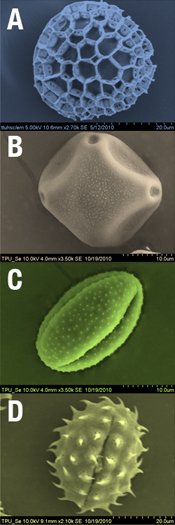Dr. Harvinder Singh Gill Receives DARPA Young Faculty Award for Innovative Use of Pollen Grains for Vaccine Delivery
By Chinwe Obi and Jeff Sammons

Dr. Harvinder Singh Gill, an assistant professor of chemical engineering, was awarded a Young Faculty Award (YFA) from the Defense Advanced Research Projects Agency (DARPA). Gill's research will investigate a revolutionary way for vaccines to be delivered orally through pollen grains. The objective of the YFA program is to identify and engage rising research stars in junior faculty positions at U.S. academic institutions and expose them to Department of Defense needs, as well as DARPA's program development process. YFA award recipients are given approximately $150,000 per year for two years to further develop their innovative projects.
Most modern vaccines are administered by injecting a needle into a muscle of the arm or leg. This method, known as an intramuscular injection, is painful, requires specially trained practitioners, is inconvenient for patients, and is generally not self-administrable. Medical research continually searches for less invasive or more efficient delivery systems for vaccinations and other medications.

(A) Lycopodium clavatum (clubmoss) spores, (B) Alnus glutinosa (alder black), (C) Artemisia vulgaris (mugwort), (D) Helianthus annuus (sunflower). Pseudo color added to images.
One route of vaccine delivery with high potential, but many obstacles, is oral delivery. This method is minimally invasive and convenient, but is often inhibited by the body's own defenses and processes. When patients ingest vaccinations or other medications, stomach acids and other digestive processes can limit the vaccination's effectiveness. If, however, a shell or carrier could be developed that could safeguard the vaccination against harsh conditions, oral vaccinations could be employed in safe and effective ways.
This potential for oral delivery piqued Gill's interest and he began to investigate potential solutions to this problem. In his search, he identified pollen grains as a potential solution. These carriers of plant matter are nature's way of perpetuating plant life and are made to withstand extreme conditions to safely transport genetic material to flowers. However, pollen grains are negatively associated with allergic reactions in humans. Gill hypothesized that if he could remove the offending and allergic reaction-causing proteins and fats present in the pollen, he could reveal a natural empty shell and create a delivery method with very unique properties.
The outer shells of pollen grains are very durable and robust. They can withstand very harsh surroundings, including acidic environments and digestive enzymes that are present in the stomach. Importantly — despite their relatively large size — pollens can move through the intestinal lining and carry vaccines.
To test his hypothesis, Gill conducted several experiments with lycopodium spores, more commonly referred to as club moss, which are approximately 25 microns in diameter. He removed the spores' native proteins, fats, and lipids and filled them with ovalbumin as a model protein vaccine. The model vaccine-infused pollen grain shells then were fed to mice.
Once consumed, the shells were able to withstand the acidic and digestive environment of the stomach and traveled to the intestines. The intestines, however, are lined with tightly-packed cells designed to prevent bacteria and virus penetration. Fortunately, as he predicted, the grains were able to pass into the bloodstream, and with time, the mice showed excellent immune responses. This immune response not only exceeded that obtained from feeding mice with just the protein-vaccine without lycopodium spores, but it also exceeded that from the use of cholera toxin as an immune-enhancing agent. Cholera toxin, although toxic to humans, is often used as a benchmark to compare oral vaccine formulations. Gill's study showed that pollens may surpass this current standard without causing toxicity.
Oral vaccines are often the best option to fight off viruses and bacteria because 99 percent of them enter the body through mucosal surfaces such as the lungs, nose, and intestines. A major limitation of intramuscular injections is that they bypass the special lymphoid tissues found in the mucosal regions of humans that help produce mucosal immune responses. Orally-ingested vaccines have the potential to stimulate these lymphoid tissues and generate a first line of defense on the mucosal surfaces to prevent the entry of pathogens into the body.

(A) unfilled spores, (B) spores filled with sulforhodamine as model dye (molecular weight: 558 Da), and (C) spores filled with dye-labeled ovalbumin as model protein vaccine (molecular weight 45,000 Da).
This system also has logistical and monetary advantages for use in military applications. For example, in the event of a bioterrorist attack, orally consumed vaccines could be dropped from a parachute directly to affected areas. In many cases, refrigeration or specialized storage would not be required, and troops or the public — even those without medical training — could self-vaccinate or self-medicate.
The initial results of this study have the potential to open new doors for oral delivery of vaccines. Pollen grains are naturally occurring, are easily absorbed by the body, are inexpensive to acquire (as low as a few cents per gram), and could provide many advantages over traditional intramuscular delivery.
Gill joined the Department of Chemical Engineering at Texas Tech in 2009. He received a Ph.D. in Bioengineering from Georgia Institute of Technology and has completed post-doctoral work in microbiology and immunology at Emory University. Gill has also received numerous honors and awards, including Sigma Xi Best Thesis Award for his thesis at Georgia Tech in 2008, the Best Doctoral Paper Award at the Science Applications International Cooperation (SAIC) in 2008, and the Dr. Charles Burford Faculty Award at Texas Tech University in 2011.
Edward E. Whitacre Jr. College of Engineering
-
Address
100 Engineering Center Box 43103 Lubbock, Texas 79409-3103 -
Phone
806.742.3451 -
Email
webmaster.coe@ttu.edu
